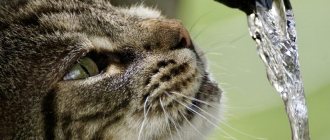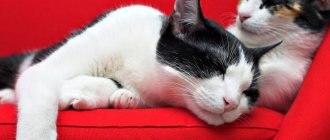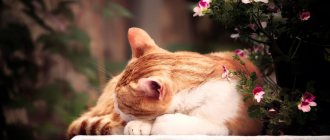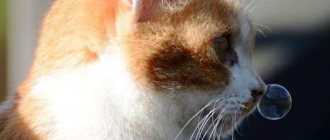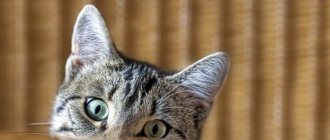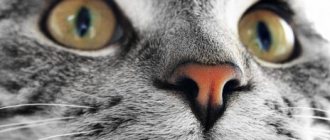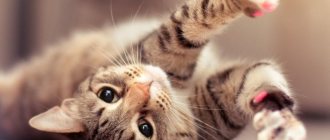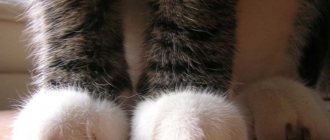The mechanism of purring in cats
Zoologists studying the process of purring put forward three hypotheses regarding the mechanism of rumbling:
- Cats purr using false vocal cords;
- Rumbling occurs due to air vibrations in the sinuses;
- Rumbling occurs in the lungs when air is exhaled.
The vocal cord hypothesis suggests that when a cat opens its mouth, it makes a meow, and when its mouth is closed, air vibrates in the larynx and creates a purr.
Other experts believe that when a cat experiences positive emotions, its blood pressure increases. Due to this, vibration appears in the chest and is transmitted to the sinuses, resulting in purring.
Still others believe that the rumbling is generated by the vibration of the intercostal and diaphragmatic muscles during inhalation and exhalation. Which part of the feline brain is responsible for purring is still unknown.
What is the origin of a cat's chirping?
It has been suggested that the origin of cats' chirping comes from the kitten. One theory states that a cat's chirping is a way for a mother to herd her kittens into a group to follow her. It is also said that the cat's chirping can be used in return by the kitten as a way to attract the mother cat's attention.
Surprisingly, the cat's chirping is seductive—and, let's be honest, hilarious as hell—a mixture of excitement and frustration. So think of it like a kid in a candy store trying to convince one of his parents that he wants those sweets.
Cat emotions and rumbling
There are many emotional states that cause a cat to purr.
The most basic ones are:
- Gratitude. A small pet purrs with pleasure from affection, a treat received, or from being close to its owner.
- Relaxation before bed. When a cat feels safe, relaxingly dozes before bed in the sun or in the arms of its owner, it purrs with pleasure.
- Dialogue between a cat and kittens. The cat, approaching the kittens, purrs, calming them down. In the wild, kittens were often left alone while their parents hunted, and thus the adults warned them that there was nothing to be afraid of.
- Self-medication and treatment. If the cat is sick or one of the pets is sick, it stabilizes the metabolism and blood circulation process due to vibrations. At these moments it is better not to touch the animal.
- Hunting interest. A cat may make purring sounds when playing or watching “game.” This is how she shows her interest.
- Fear and aggression. Many people have watched cats purr before a fight. This is how cats express their dissatisfaction and readiness to attack.
In different situations and different emotional states of the pet, the rumbling has a different tone.
When communicating with other animals, a cat may purr quietly, which indicates its trust. If a cat purrs loudly when meeting other cats, then it shows a leadership position and a readiness to attack. Sometimes purring is a request for mercy if the animal understands that it is weaker than its opponent.
Why does my cat start chirping strangely?
Contents hide
Let's look at another riddle performed by mustachioed friends. The cat opens its mouth slightly, as if about to meow or even hiss. But at the same time it produces a very interesting sound that is incomparable in timbre. This is not the classic “meow”, this is something else. The sound is short and difficult to convey in writing. The result will be something like a cursory “meh” or even “uh”. But it can be compared to bird chirping, hence the name. In addition, some owners think that their pets squeak funny. Let's figure it out.
Why do cats make such sounds? As we noted above, sounds are different - their tonality depends on the individual characteristics of the pet. Squeaks, clicking sounds, “meh” and “mrrm” - you can hear all this from your pet. But what does the animal want to say? Some experts believe that cats make unusual sounds when they detect future prey. We beg to differ: cats, when hunting, try to remain as quiet as possible so as not to give themselves away. But you can hear chirping from a cat sitting on the windowsill quite often. Another situation: you are sitting alone in a room, minding your own business. Suddenly a tailed friend comes into the room and emits his mysterious “trill.”
Again there is room for broad interpretation! In the case of the window sill, everything is clear: the cat clearly noticed something interesting. For example, birds. But the glass does not allow the hunt to begin. We interpret the abrupt chirping as severe disappointment. Sometimes cats chirp with impatience. They say we would like to do it right now, but we don’t have the opportunity yet. In the case where the tweeting is addressed to people, options are possible. As you know, cats, despite all their independence, love to spend time in close proximity to their owners. But here’s the problem: the pet slept and slept and did not find the owner after waking up. I went in search. Found. And then he made a sound comparable to an angry muttering. “Who gave you permission to leave me?” However, other, joyful trills are also possible - they cannot be confused with anything.
In some cases, chirping is “interpreted” as excitement - joyful or not. You have to look at the situation. For example, a cat finally discovered its owner, expressed its dissatisfaction, but itself is happy and craves closer communication. And, if you suddenly start stroking and caressing the animal, you can just hear “that same” joyful trill - a long and pleasant to the ear “mmmrrrrmmm”. The translation will reassure you: “How good and pleasant it is for me, how you, dear master, guessed my secret desires!”
But not everything is so simple. The author’s favorite saying is that no two cats are alike. Thus, it is relatively common to come across pets with rich vocalizations - they like to comment on all their actions. So, in such animals, chirping is often understood as resentment or the experience of failure. The more upset the cat is, the more insistently she chirps. Again, you need to look at the specific situation.
How to respond to cat chirping? Our answer will surprise some - no way. Just listen and enjoy communicating with your pet. In general, the sound of chirping is neutral, and it does not carry any negative connotations. It should be emphasized that not all cats “chirp”. And some specimens, on the contrary, produce rather loud trills, and with enviable consistency. Including night time. But here we can only sympathize - we are dealing with an absolutely normal and natural model of cat behavior.
We only recommend that you either close the curtains tightly at night or exclude your pet from entering the bedroom. Alternatively, play an active and active game with your cat shortly before bedtime, and then feed it. Most likely, your cat will get tired and go to bed peacefully without disturbing anyone.
Material used: What is the meaning of cat chirping? Source: wamiz.co.uk Photo: sophiecat – Shutterstock
Rumbling in communication with a person
Cat owners most often perceive purring as a sign of gratitude, but cats express a whole range of emotions with this sound. Let's figure out why cats purr.
- Cats are very sensitive to the emotional state of the owner. If the owner is tired, upset or depressed, the small pet will always try to lie down next to him or in his arms and begin to purr. It has been scientifically proven that the frequency of purring puts a person into a trance, akin to meditative practices, and he calms down.
- Often, purring is an expression of pleasure. When you pet your pet to show your love, your cat will begin to purr to show how much she likes it.
- Domestic cats are talented manipulators. When begging for a treat or affection, they may poke their heads into your hand, making a purring noise. Or rub against your legs.
- If, lying next to the owner, the cat stops purring and listens, it means that something has alerted the animal.
If your cat is constantly purring, you should pay attention to your pet's health. The animal may be sick or injured. The pet could have problems with the vocal cords, and the cat is simply not able to meow.
Owners who wonder why a cat purrs like a tractor may simply not notice that not everything is all right with the animal, and in this way it heals and calms itself.
An attentive owner will always notice oddities in the pet’s behavior.
A few words about the phenomenon
Cats have been accompanying humans since ancient times; these small predators were first domesticated during the first dynasties of the pharaohs of Ancient Egypt. Here, the cat-headed goddess Bast personified joy, fun and love, feminine grace and beauty, fertility and home. Four kittens were sure to frolic, play and purr near her feet as a symbol of motherhood. Later, in the dark Middle Ages, when there was a real rampant of obscurantism, cute cats became the personification of the devil and faithful companions of witches, sorcerers, and Satanists.
© shutterstock
Despite the diametric difference in opinions and views, people have always strived to be friends with these animals. Cats are amazing, especially when you pet them. Scientists have devoted a lot of time to trying to study the phenomenon of these mysterious sounds. However, even today it is still not completely clear why, when you pet cats, they purr. Modern research methods have made it possible to somewhat clarify the theories of the phenomenon of cats purring when you stroke them .
- First of all, it was experimentally established that these animals have strong electromagnetic impulses of natural origin, in particular, if you stroke them;
- The natural biological electric field activates a complex of organs, which allows the animal to reproduce sounds of a strictly defined timbre, strength, and volume.
For people with serious pathologies, modern medicine strongly recommends communicating with a cat that begins to purr when you stroke them. Tips to stroke the soft fluffy fur, cause a rumbling sound from deep within the animal’s body, create an amazing aura that can heal the patient and bring him significant relief.
Rumbling as a remedy
Scientific studies have confirmed that cat owners are less likely to suffer from nervous disorders, cardiovascular diseases, arthritis, arthrosis and respiratory diseases. In families where there are cats, children have higher immunity.
- The range of frequencies that a cat makes when purring stimulates the brain's defense mechanisms and has a beneficial effect on metabolism.
- Due to the heat that the cat transmits while lying on a sore spot and under the influence of vibration, blood circulation improves. Under the influence of low frequency vibrations, increased production of endorphins begins, which significantly reduces pain.
- Doctors have long noticed this feature, which is why they often recommend that older people get a cat. The patients themselves confirm that after contact with a purring cat they feel better, and medical examinations confirm this.
British scientists have even developed a new therapeutic method - cat therapy, which is successfully used all over the world.
Cats themselves have increased stamina because they can heal themselves by purring. Their wounds and injuries heal much faster than those of other animals, which gave rise to the saying that “a cat has nine lives.”
Elderly cat howls
Older cats howl quite often because they often suffer from various ailments that older people suffer from in the form of cognitive dysfunction. Older cats howl is a characteristic of their mental confusion, so they will often howl when they are disoriented.
It is also common to see older cats howling at night, as this is a time when they can become more disoriented due to poor lighting. This can be very frustrating to see, so there are a number of steps the owner can take.
© shutterstock
They can either try using a night light when it gets dark, or take the cat to a veterinarian, who can give the cat medication to help with their cognitive functioning or anxiety that arises from their deteriorating mind.
In short, senior cat howling is just one of those things that happen to varying degrees of severity in an aging cat.
Interesting facts about rumbling
- Cats never meow when communicating with each other; they either purr or hiss;
- If you need your cat to stop purring, just turn on the water. The sound of flowing water will silence the animal.
- Kittens that do not yet have hearing purr while eating, expressing their pleasure;
- A cat's purring during sleep replaces its physical activity;
- Purring before bed helps both the cat and its owner fall asleep, as it drowns out the sounds of breathing and heartbeat.
Rumbling has many emotional connotations. Still, more often than not, pets purr with pleasure. When a cat is fed, caressed and healthy, it will gratefully please its owner with a loud purr.
Hiss
It’s simply impossible not to understand a cat when it hisses. “Don't come near! I’ll kill you!” - this is what the frightened little predator, ready to fight for his life, is trying to convey to you. The source of stress can be a large annoying dog or, even more likely, a small child. Often the cat does not just hiss, but arches his back, raises his fur and bares his fangs, demonstrating how dangerous he is. If your cat hisses, leave him alone and try to eliminate the source of irritation and threat.
Hissing is very individual. Each cat has its own understanding of personal boundaries and comfort zone. Some friendly and sociable cats almost never hiss, while there are also withdrawn, shy and even socially phobic cats who almost always drive away sources of irritation from themselves by hissing. Cats that are most likely to hiss are those that were once either rejected by a person, grew up in a shelter, or were abused.
Found a violation? Report content
What does a cat sound like?
A cat's chirp, also called a chirp or trill, is a short, high-pitched sound similar to the chirping of a songbird.
According to International Cat Care, cat sounds fall into three categories: purring, meowing and aggressive. Chirping is considered a type of purring along with rumbling, which the ICC describes as a sound "formed primarily without opening the mouth."
Signal to relatives
Despite the fact that the cat is considered an individualist, it has some collective instincts. It is much easier to catch prey together than alone, so this sound is used to attract relatives. The specific signal is not recognized by birds and is intended only for other cats. It is given instinctively, so the animal does not analyze the real possibility of attracting fellow animals to the scene of events.
Signal to relatives
Despite the fact that the cat is considered an individualist, it has some collective instincts. It is much easier to catch prey together than alone, so this sound is used to attract relatives. The specific signal is not recognized by birds and is intended only for other cats. It is given instinctively, so the animal does not analyze the real possibility of attracting fellow animals to the scene of events.


